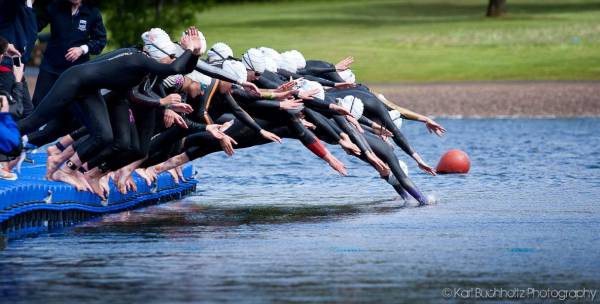I began triathlon in 2006, after a friend convinced me to train with him. I was a rescue swimmer stationed in Bahrain, had nothing better to do, and enjoyed a challenge. In 2009, I starting coaching the sport of triathlon to individuals. I already had experience in teaching and coaching swimming, so it seemed a natural progression.
Fast forward to now: I have learned a lot when it comes to coaching, due to both my successes and my failures. Here are some of the things I have learned, though it is not and will never be a comprehensive list. Just as others before me would agree, you can never stop learning.
Strength on the Bike Carries Over to the Run (and Vice Versa)
This doesn’t mean that if you only bike train that you will be a great runner. What I am saying is that when you do a lot of strength-type work on the bike, it builds you up mentally and can carry over to the run. I actually prefer to say the opposite works better: doing aerobic or lower-intensity style training with a focus on strength (hills or fartlek) helps build bike strength and endurance.
I learned this firsthand while I was on deployment since I never had access to a bike. I ran, and ran, and ran some more, because that is all I had available. I was training for a half-Ironman and once I got off deployment, I discovered I was in the best bike shape I had ever been in. While aerobic and speed workouts are great, it was the strength building workouts I added in while running that made the difference.
The Ethical and Scientific Dilemma of Helmets
I am ethically and scientifically torn when it comes to recommending helmets for athletes. Data proves that aero helmets are faster. This is great for all athletes. But when we look at the safety data and the reduction of body temperature, we see that regular road helmets are safer.
Aero helmets have been shown to possibly result in snapping the neck and causing severe paralysis in a crash. This scenario is something you don’t see in road helmets. Regular road helmet wouldn’t snap your neck in the way an aero helmet will. This is where my ethical dilemma exists. I want my athletes to go as fast as possible, but I also want them to be as safe as possible. To this day I tell my athletes to wear road helmets and that’s what I advise you to do, as well.
The Rules of Some Races Make Me Question Racing Organizations
Really, this comes down to Ironman. I have done race officiating for USA Triathlon and Ironman and have had my share of complaints and disagreements with the rules that I am bound to enforce. But the one rule I struggle with the most is why they don’t allow participants of events to run across the finish line with their kids. I think every athlete should be able to celebrate a race such as a Ironman with their family, due to the struggles and commitment they all faced to get there.

My suggestion? Don’t race an event where they limit you on silly small things, because in the end, you may just end up inspiring your son or daughter toward a healthier lifestyle because he or she saw your struggles and triumphs and was able to experience that final accomplishment with you.
The Ever-Changing Nature of Sports Nutrition
I love sports nutrition, and while I may not always follow the best nutrition myself, I certainly do try. I also try to help others when questions arise, but the sports nutrition guidelines seem to always be changing. That makes it frustrating for coaches, but also pushes us to get the best available information to give to our athletes.
What have I found to work the best for athletes? Periodization of nutrition should follow phases of training. Periodization of nutrition means that you focus more on veggies and whole foods in the off-season, but when your racing season and training starts to ramp up, you can then introduce more pasta and grains. But most important of all is generally sticking to the healthier options at all meals and eating when you’re hungry – not when you think you’re hungry.
Longer Fins Are Better
Longer fins focus on leg strength. While everyone will argue with me until the sun goes down about why smaller fins are better, I have to disagree, and mainly because of being a rescue swimmer. I grew up swimming and have a terrible kick. My coach would give me shorter fins to help me with my kick, and guess what? They didn’t help!
When I became a rescue swimmer, we were forced to use longer and more rigid fins because you need more force production to be able to carry or drag people in the ocean – and the longer and more rigid fins help. Because of this I took that philosophy to the swimming world and only recommend long fins to athletes. Yes, it slows them down at first, but over time they develop a stronger kick that will help them in open water during a triathlon race.

These are some of the things I have learned so far as an athlete and a coach. No doubt this list will evolve over time. I am a human and want what is best for my athletes, but things will change and new data will develop better techniques and philosophies that we can choose to adapt or ignore.
Photos 1 & 2 courtesy of Shutterstock.
Photo 3 courtesy of Karl Buchholtz Photography.






